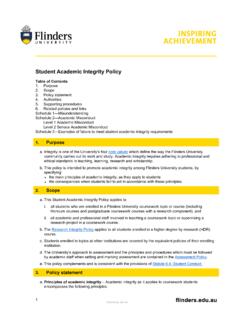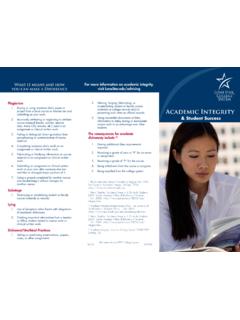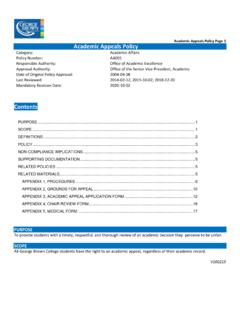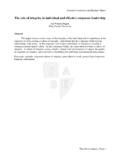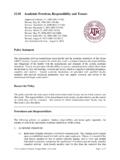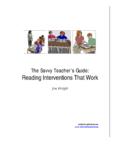Transcription of University of Toronto Governing Council
1 University of Toronto Governing Council Code of Behaviour on academic Matters Approved June 23, 2016. Effective July 1, 2016. To request an official copy of this policy, contact: The Office of the Governing Council Room 106, Simcoe Hall 27 King's College Circle University of Toronto Toronto , Ontario M5S 1A1. Phone: 416-978-6576. Fax: 416-978-8182. E-mail: Website: File under: C Web name Code of Behaviour on academic Matters [July 1, 2016] Official name: Code of Behaviour on academic Matters [July 1, 2016] updated [July 6, 2016] Location: tters%20 July%201% [Official update July 1, 2016][Last unofficial update: July 6, 2016]. Code of Behaviour on academic Matters Code of Behaviour on academic Matters A. Preamble The concern of the Code of Behaviour on academic Matters is with the responsibilities of all parties to the integrity of the teaching and learning relationship. Honesty and fairness must inform this relationship, whose basis remains one of mutual respect for the aims of education and for those ethical principles which must characterize the pursuit and transmission of knowledge in the University .
2 What distinguishes the University from other centres of research is the central place which the relationship between teaching and learning holds. It is by virtue of this relationship that the University fulfills an essential part of its traditional mandate from society, and, indeed, from history: to be an expression of, and by so doing to encourage, a habit of mind which is discriminating at the same time as it remains curious, which is at once equitable and audacious, valuing openness, honesty and courtesy before any private interests. This mandate is more than a mere pious hope. It represents a condition necessary for free enquiry, which is the University 's life blood. Its fulfillment depends upon the well being of that relationship whose parties define one another's roles as teacher and student, based upon differences in expertise, knowledge and experience, though bonded by respect, by a common passion for truth and by mutual responsibility to those principles and ideals that continue to characterize the University .
3 This Code is concerned, then, with the responsibilities of faculty members and students, not as they belong to administrative or professional or social groups, but as they co-operate in all phases of the teaching and learning relationship. Such co-operation is threatened when teacher or student forsakes respect for the other--and for others involved in learning--in favour of self-interest, when truth becomes a hostage of expediency. On behalf of teacher and student and in fulfillment of its own principles and ideals, the University has a responsibility to ensure that academic achievement is not obscured or undermined by cheating or misrepresentation, that the evaluative process meets the highest standards of fairness and honesty, and that malevolent or even mischievous disruption is not allowed to threaten the educational process. These are areas in which teacher and student necessarily share a common interest as well as common responsibilities. Note: Appendix "A" contains interpretations of the language of this Code.
4 Appendix "B" contains a statement concerning the rights and freedoms enjoyed by members of the University . B. Offences The University and its members have a responsibility to ensure that a climate which might encourage, or conditions which might enable, cheating, misrepresentation or unfairness not be tolerated. To this end, all must acknowledge that seeking credit or other advantages by fraud or misrepresentation, or seeking to disadvantage others by disruptive behaviour is unacceptable, as is any dishonesty or unfairness in dealing with the work or record of a student. Wherever in this Code an offence is described as depending on "knowing", the offence shall likewise be deemed to have been committed if the person ought reasonably to have known. University of Toronto Governing Council Web version 2. Code of Behaviour on academic Matters 1. It shall be an offence for a student knowingly: (a) to forge or in any other way alter or falsify any document or evidence required by the University , or to utter, circulate or make use of any such forged, altered or falsified document, whether the record be in print or electronic form.
5 (b) to use or possess an unauthorized aid or aids or obtain unauthorized assistance in any academic examination or term test or in connection with any other form of academic work;. (c) to personate another person, or to have another person personate, at any academic examination or term test or in connection with any other form of academic work;. (d) to represent as one's own any idea or expression of an idea or work of another in any academic examination or term test or in connection with any other form of academic work, to commit plagiarism (for a more detailed account of plagiarism, see Appendix "A") ;. (e) to submit, without the knowledge and approval of the instructor to whom it is submitted, any academic work for which credit has previously been obtained or is being sought in another course or program of study in the University or elsewhere;. (f) to submit any academic work containing a purported statement of fact or reference to a source which has been concocted.
6 2. It shall be an offence for a faculty member knowingly: (a) to approve any of the previously described offences;. (b) to evaluate an application for admission or transfer to a course or program of study by reference to any criterion that is not academically justified;. (c) to evaluate academic work by a student by reference to any criterion that does not relate to its merit, to the time within which it is to be submitted or to the manner in which it is to be performed. 3. It shall be an offence for a faculty member and student alike knowingly: (a) to forge or in any other way alter or falsify any academic record, or to utter, circulate or make use of any such forged, altered or falsified record, whether the record be in print or electronic form;. (b) to engage in any form of cheating, academic dishonesty or misconduct, fraud or misrepresentation not herein otherwise described, in order to obtain academic credit or other academic advantage of any kind. 4. A graduate of the University may be charged with any of the above offences committed knowingly while he or she was an active student, when, in the opinion of the Provost, the offence, if detected, would have resulted in a sanction sufficiently severe that the degree would not have been granted at the time that it was.
7 Parties to Offences 1. (a) Every member is a party to an offence under this Code who knowingly: (i) actually commits it;. (ii) does or omits to do anything for the purpose of aiding or assisting another member to commit the offence;. (iii) does or omits to do anything for the purpose of aiding or assisting any other person who, if that person were a member, would have committed the offence;. University of Toronto Governing Council Web version 3. Code of Behaviour on academic Matters (iv) abets, counsels, procures or conspires with another member to commit or be a party to an offence; or (v) abets, counsels, procures or conspires with any other person who, if that person were a member, would have committed or have been a party to the offence. (b) Every party to an offence under this Code is liable upon admission of the commission thereof, or upon conviction, as the case may be, to the sanctions applicable to that offence. 2. Every member who, having an intent to commit an offence under this Code, does or omits to do anything for the purpose of carrying out that intention (other than mere preparation to commit the offence) is guilty of an attempt to commit the offence and liable upon conviction to the same sanctions as if he or she had committed the offence.
8 3. When a group is found guilty of an offence under this Code, every officer, director or agent of the group, being a member of the University , who directed, authorized or participated in the commission of the offence is a party to and guilty of the offence and is liable upon conviction to the sanctions provided for the offence. C. Procedures in Cases Involving Students At both the divisional level and the level of the University Tribunal, the procedures for handling charges of academic offences involving students reflect the gravity with which the University views such offences. At the same time, these procedures and those which ensure students the right of appeal represent the University 's commitment to fairness and the cause of justice. (a) Divisional Procedures Note: Where a student commits an offence, the faculty in which the student is registered has responsibility over the student in the matter. In the case of Scarborough and Erindale Colleges, the college is deemed to be the faculty.
9 Not proceedings of 1. No hearing within the meaning of section 2 of the Statutory Powers Tribunal Procedure Act is required for the purposes of or in connection with any of the discussions, meetings and determinations referred to in section (a), and such discussions, meetings and determinations are not proceedings of the Tribunal. instructor's duties 2. Where an instructor has reasonable grounds to believe that an academic offence has been committed by a student, the instructor shall so inform the student immediately after learning of the act or conduct complained of, giving reasons, and invite the student to discuss the matter. Nothing the student says in such a discussion may be used or receivable in evidence against the student. 3. If after such discussion, the instructor is satisfied that no academic offence has been committed, he or she shall so inform the student and no further action shall be taken in the matter by the instructor, unless fresh evidence comes to the attention of the instructor, in which case he or she may again proceed in accordance with subsection 2.
10 Instructor's report to 4. If after such discussion, the instructor believes that an academic offence has the department chair been committed by the student, or if the student fails or neglects to respond to the invitation for discussion, the instructor shall make a report of the matter to the department chair or through the department chair to the dean. (See also section (b) 1.). dean's or chair's 5. When the dean or the department chair, as the case may be, has been so meeting with student University of Toronto Governing Council Web version 4. Code of Behaviour on academic Matters informed, he or she shall notify the student in writing accordingly, provide him or her with a copy of the Code and subsequently afford the student an opportunity for discussion of the matter. In the case of the dean being informed, the chair of the department and the instructor shall be invited by the dean to be present at the meeting with the student. The dean shall conduct the interview.

